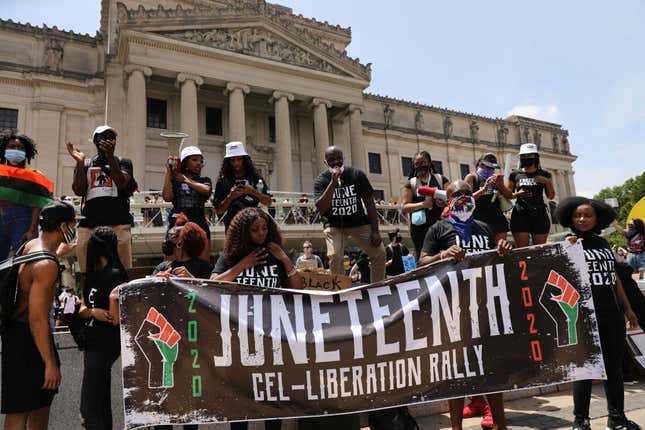
Although it’s great to see Juneteenth recognized as a federal holiday, it needs to be more than just a paid day off. It is a day to recognize the manifestation of history’s destruction into our present and act towards a more progressive and inclusive future. Another three-day weekend does little to address the decades of political, economic, and social disenfranchisement of Black people—justice cannot wait any longer. We need reparations, and we need them now.
If anything, this speedy legislative move shows that elected officials are able to get things done fast, so why are they stalling on legislation like the House Resolution 40, filibuster, voting rights protections, or any other legislation that actually guarantees equity for Black communities? Acknowledging our history is just the first step and we cannot mistake this move as anything that will ensure the political power of our communities. If the House were to vote to recognize the legacy of slavery as a federal holiday, what’s the hold up on passing reparations legislation for Black people?
It’s no secret that corporations have the influence to enact policies that empower their Black workers. We’ve already seen statements of solidarity and Black fists as promotional graphics from the corporations that claim to stand with Black people. Yet, we’ve also seen how these corporations refuse to provide livable wages or worker protections for their Black employees.
Elected officials are no different. Powerful decision-makers have become too comfortable in virtue signaling and performative activism without any intention of creating tangible change for our communities or prioritizing reparative justice. While attending the Tulsa centennial, President Biden made no mention of reparations and even discouraged any real strides for legislative action. Enacting real power for Black communities takes more than a quick speech on a weekend work trip—it involves listening to the demands of the community and representing them effectively.
This Juneteenth, we’re demanding that elected officials and corporate leaders spare us the performative publicity stunts and get to work on supporting reparative justice efforts by passing House Resolution 40.
Last month, the survivors of the Tulsa Race Massacre received financial gifts of $100,000 each from Justice for Greenwood Foundation and Color Of Change fundraising and the donations have been celebrated as a major turnaround from the usual discouragement in efforts for reparations. However, these financial gifts are only a result of the immense pressure from organizations like Justice for Greenwood and our national members—not from the insurance companies or elected officials who denied any form of relief for the survivors in the 100 years since the attack.
We don’t need reparations only because of what happened decades ago—we need them because of what is happening today. The centennial commemoration in Tulsa reminds us that our nation’s history does not remain in the past, but transcends to our present everyday lives. We cannot wait for another 100 year commemoration to finally recognize that we need reparations now. If elected leaders truly wanted to celebrate Juneteenth, they wouldn’t just acknowledge the day and call it a job well done. They would move beyond words to actions and pass legislation to rebuild a society to ensure justice, freedom, safety and prosperity for our communities.
House Resolution 40, or the Commission to Study and Develop Reparation Proposals for African-Americans Act, is a necessary and clear step to remedy structural racism and white supremacy in the United States. This federal bill would provide the proper procedure to make reparative justice real for Black people—providing businesses PPP loans at higher rates and restoring the businesses lost through white supremacist violence, implementing public transportation for geographically segregated Black communities, and the opportunity to reinvest into resources locally so that we can ensure our communities thrive.
Members of Congress’ hesitation around supporting the bill, among others related to real racial justice, are excuses to “save their seat’’ in the 2022 midterm election. Yet, if they are dedicated enough to recognize the legacy of slavery on a national level, there should be no controversy in acting to relieve the impact of that legacy through passing H.R. 40.
Efforts for reparations are already happening today—aside from economic gifts for the Tulsa survivors that were a result of campaigning from Black organizations, stimulus relief for Black farmers who lost the majority of their land from years of systemic bias, and demands for banks to rectify their acts in racist loan discrimination are active results of the work of organizations fighting for Black community restoration. We have the collective power to demand the justice Black communities are owed and begin to reconcile the lasting effects of slavery.
Recognizing pain is just the first step. What comes next is reimagining and rebuilding a society in which Black lives truly matter. It means moving beyond words to actions. Reparations are not just about addressing the past, but about ensuring that Black communities receive the justice, safety, and stability they are owed presently and in the years to come. This Juneteenth, as we celebrate freedom and resilience, we’re calling for Black prosperity to be prioritized. We have the power to alter the future cycle of history repeating itself by demanding to prioritize reparations legislation that will guarantee Black communities’ political power, not just a day off of work. We must pass sweeping, national reform to even begin to address this glaring oversight, or it will be another centennial commemoration when we are asking the same question: when will justice be real?
Jade Magnus Ogunnaike is Senior Campaign Director of Color Of Change, the largest online racial justice organization in the country. Color Of Change helps people respond effectively to injustice in the world around us. As a national online force driven by over 7 million members, we move decision-makers in corporations and government to create a more human and less hostile world for Black people in America. Visit www.colorofchange.org.

